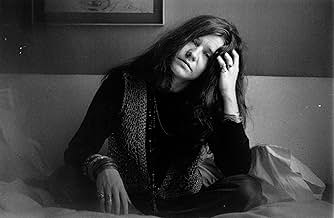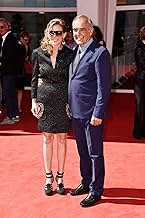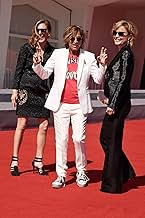IMDb RATING
7.4/10
5.8K
YOUR RATING
Musician Cat Power narrates this documentary on Janis Joplin's evolution into a star from letters that Joplin wrote over the years to her friends, family, and collaborators.Musician Cat Power narrates this documentary on Janis Joplin's evolution into a star from letters that Joplin wrote over the years to her friends, family, and collaborators.Musician Cat Power narrates this documentary on Janis Joplin's evolution into a star from letters that Joplin wrote over the years to her friends, family, and collaborators.
- Awards
- 2 wins & 2 nominations total
Cat Power
- Janis Joplin
- (voice)
- (as Chan Marshall)
Janis Joplin
- Self
- (archive footage)
Otis Redding
- Self
- (archive footage)
- Director
- Writer
- All cast & crew
- Production, box office & more at IMDbPro
Featured reviews
The recent documentary Amy, depicting singer Amy Winehouse's rise and fall at about the same age as Janis Joplin reminds me that all rockers are not the same, especially females. Janis: Little Girl Blue depicts Joplin as much more focused than Amy and much more in control of her own life. Except for in death, where both succumb to substance abuse, even the relatively more stable Amy.
This Janis doc does an effective job showing the arc of her brief life, from a country girl in Texas to the rocker who led the way for women in the industry and eventually the world. Why the eventual failure given her great fame and fortune? It's simple, really: She wanted to be loved, and not always finding that devotion, she could turn to music and drugs for support and fulfillment.
Along the way, the doc gives insight into what makes this blues mama run: In her own words she says ambition is the desire to be loved. She's not a "Cry Baby" about not getting the love she wanted from some of her friends and family; actually family members talk to us and appear to have supported her through it all.
Her straight-laced parents couldn't be expected to wholly embrace the counter-culture queen, who began innocently singing folk tunes in her early teens and ended singing blues that reminded one critic of "desperate mating calls." Professionally she gets plenty of love from the likes of Khris Kristofferson, whose Me & Bobby Magee was her best-selling single ever and band mate David Goetz, who observed that she turned into a caricature of the blues mama that the media had helped to create. Dick Cavett interviews her with an unusual affection different from his usually detached persona. At one point he can't remember if they were intimate—a nice touch of amnesia that doesn't belie a bit his attachment to her.
Janis: Little Girl Blue informs about Joplin's career from folk to hard blues, gives insight into the driving emotions of her ambition, and amply shows her singing talents that made her a child of Aretha Franklin and her own person.
A greatly satisfying bio of a great singer.
This Janis doc does an effective job showing the arc of her brief life, from a country girl in Texas to the rocker who led the way for women in the industry and eventually the world. Why the eventual failure given her great fame and fortune? It's simple, really: She wanted to be loved, and not always finding that devotion, she could turn to music and drugs for support and fulfillment.
Along the way, the doc gives insight into what makes this blues mama run: In her own words she says ambition is the desire to be loved. She's not a "Cry Baby" about not getting the love she wanted from some of her friends and family; actually family members talk to us and appear to have supported her through it all.
Her straight-laced parents couldn't be expected to wholly embrace the counter-culture queen, who began innocently singing folk tunes in her early teens and ended singing blues that reminded one critic of "desperate mating calls." Professionally she gets plenty of love from the likes of Khris Kristofferson, whose Me & Bobby Magee was her best-selling single ever and band mate David Goetz, who observed that she turned into a caricature of the blues mama that the media had helped to create. Dick Cavett interviews her with an unusual affection different from his usually detached persona. At one point he can't remember if they were intimate—a nice touch of amnesia that doesn't belie a bit his attachment to her.
Janis: Little Girl Blue informs about Joplin's career from folk to hard blues, gives insight into the driving emotions of her ambition, and amply shows her singing talents that made her a child of Aretha Franklin and her own person.
A greatly satisfying bio of a great singer.
Of course I know who Janis Joplin was, who doesn't, but I was never a huge fan of her work, so I did not know anything about her life story.
And what a great story it was, told by those who knew Janis the most, the Documentary was loaded with interviews from the people closet to her who were there for the ride that was her life. Mixed in with a lot of archive footage of Joplin as well as a touching voice over of letters Joplin wrote to her family back home being read during the film.
But most importantly, lots of music was played. I've seen docs and other movies about major rock icons where the music was not center stage simple because of legal rights. Does not feel like Little Girl Blue had that problem, and I'm thankful, cause as much as her life was interesting, it's all about the music.
It was funny, entertaining, and centered on the rock and roll as they told the story of one of the greatest icons in music history.
And what a great story it was, told by those who knew Janis the most, the Documentary was loaded with interviews from the people closet to her who were there for the ride that was her life. Mixed in with a lot of archive footage of Joplin as well as a touching voice over of letters Joplin wrote to her family back home being read during the film.
But most importantly, lots of music was played. I've seen docs and other movies about major rock icons where the music was not center stage simple because of legal rights. Does not feel like Little Girl Blue had that problem, and I'm thankful, cause as much as her life was interesting, it's all about the music.
It was funny, entertaining, and centered on the rock and roll as they told the story of one of the greatest icons in music history.
Viewed at 2015 Venice Film Festival., "Janis, Little Girl Blue" by Amy Berg, With Alex Gibney, himself an outstanding documentarian acting as producer, is a Great Doc about a great American singer, Janis Joplin, who died too young on the verge of salvation.
Interviews with parents, sister, brother, surviving members of The Grateful Dead, Kris Kristofferson, and most surprising, Dick Cavett (1970). In a year of many good documentaries, this was the best of all -- a marvelous reconstruction of a tragic young life. Janis sang the blues with such conviction and such black feeling that even afro-Americans though she was black -- She died on October 4, 1970 in a Hollywood motel of an accidental heroin overdose at age 27 -- only two weeks after another rock legend, Jimi Hendrix, also at age 27. The film traces her life from humble origins in the nondescript north Texas town of Port Arthur, constant humiliation by her schoolmates because of her extreme nonconformity and relatively plain looks, up through her rise to prominence as the lead singer of the acid/rock band Big Brother and the Holding Company --one of the leading San Francisco rock groups of the mid sixties -- reaching the pinnacle when recognized as the top white blues singer of the age, her difficulties dealing with fame, her loneliness in the midst of adoring crowds, her battle with drug addiction, and finally her tragic early death on the verge of even wider fame and general acceptance by the serious music world.
Needless to say, the film is liberally spiced with clips from her amazing stage appearances, which is an added enrichment, but this is far from a mere excuse to present her songs -- far more a penetrating probe into the life of an extremely complex personality ---a true artist who became the victim of her own profound talent. Myself more or less a product of the psychedelic sixties, I left the vast Venice theater thoroughly emotionally drained and realizing I had just witnessed a remarkable film about a most remarkable life. Alex, Budapest
Interviews with parents, sister, brother, surviving members of The Grateful Dead, Kris Kristofferson, and most surprising, Dick Cavett (1970). In a year of many good documentaries, this was the best of all -- a marvelous reconstruction of a tragic young life. Janis sang the blues with such conviction and such black feeling that even afro-Americans though she was black -- She died on October 4, 1970 in a Hollywood motel of an accidental heroin overdose at age 27 -- only two weeks after another rock legend, Jimi Hendrix, also at age 27. The film traces her life from humble origins in the nondescript north Texas town of Port Arthur, constant humiliation by her schoolmates because of her extreme nonconformity and relatively plain looks, up through her rise to prominence as the lead singer of the acid/rock band Big Brother and the Holding Company --one of the leading San Francisco rock groups of the mid sixties -- reaching the pinnacle when recognized as the top white blues singer of the age, her difficulties dealing with fame, her loneliness in the midst of adoring crowds, her battle with drug addiction, and finally her tragic early death on the verge of even wider fame and general acceptance by the serious music world.
Needless to say, the film is liberally spiced with clips from her amazing stage appearances, which is an added enrichment, but this is far from a mere excuse to present her songs -- far more a penetrating probe into the life of an extremely complex personality ---a true artist who became the victim of her own profound talent. Myself more or less a product of the psychedelic sixties, I left the vast Venice theater thoroughly emotionally drained and realizing I had just witnessed a remarkable film about a most remarkable life. Alex, Budapest
This documentary really brought me back to the 60s and 70s. It never ceases to amaze me how tough it is to be a creative artist, just think Brian Wilson or Amy Winehouse. We are introduced to Janis's early life and the many struggles she had to go through growing up. She leaves for California and finds her roots and her tribe with Big Brother and the Holding Company. The live performances really show the incredible rapport she had with her audience during a concert. Coming down from such a high must have been an insupportable task. Janis finds a true love during her time in Brazil which for her was very important. Her letters to her family and friends were filled with hope and optimism right up to her tragic death. Interviews with her various friends and colleagues all painted a picture of a very unique and spontaneous person. The world was truly inspired by a pure spirit.
It has not been a different life than the other 27's. It has not been a different life than other real stars. Filmin structure was not good. I guess they did it without much effort. He did not elaborate after Janis's death. No special music was made for the film. I did not like your director very much. The film has not succeeded in dramatic places as well. It was not nice without Janis. There was an air of sadness. Although a girl who was excluded in her childhood and adolescence was given a nice star, she had not been given any details when necessary.
Did you know
- ConnectionsFeatures Monterey Pop (1968)
- How long is Janis: Little Girl Blue?Powered by Alexa
Details
- Release date
- Country of origin
- Official site
- Language
- Also known as
- Janis: Little Girl Blue
- Filming locations
- Haight-Ashbury, San Francisco, California, USA(archive footage)
- Production companies
- See more company credits at IMDbPro
Box office
- Gross US & Canada
- $410,465
- Opening weekend US & Canada
- $21,861
- Nov 29, 2015
- Gross worldwide
- $1,683,166
- Runtime
- 1h 43m(103 min)
- Color
- Aspect ratio
- 1.78 : 1
Contribute to this page
Suggest an edit or add missing content























